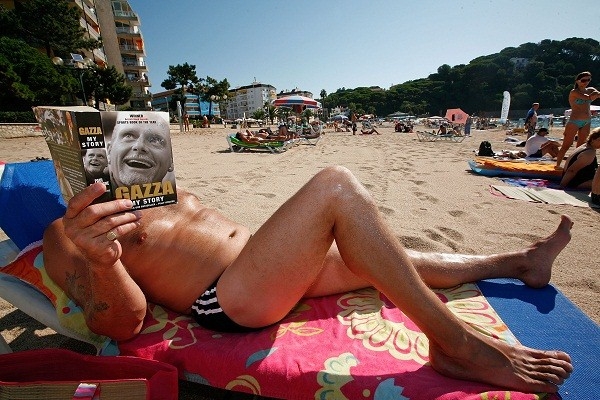Winning the Booker can do strange things. For one, critics tend to become noticeably shyer around authors with some bling in their trophy cabinets, hyperbole blunting their edge. But if ever there was a writer primed to dismantle automatic appreciation it is Howard Jacobson. Zoo Time, his first novel since The Finkler Question won the 2010 Booker Prize, does everything short of physically assaulting the reader to excuse itself from being a bland follow up. In fact, its very obnoxiousness is both its weakness and its strength.
I must confess to both liking and loathing it, pushed between extremes depending on the subject matter. (Forget narrative, simply because there isn’t one: ‘I wasn’t mad about plot’ we are rather redundantly told two-thirds of the way through). The novel encompasses two distinct themes, woven together by novelist-narrator Guy Ableman: one a very witty, almost Swiftian satire on the ‘Great Decline’ of reading and print culture; the other a rather tired attempt to water-board laughs out of Ableman’s wannabe scurrility and risqué infatuation with his mother-in-law.
This has some claim to be the first great novel about the revolution reading is currently undergoing, up there with Swift’s The Battle of the Books and with a dollop of The Dunciad to help it along. As with all satirists, Jacobson deliberately over-eggs it but delightfully so. And no doubt seminars in 2112 will be studded with the many gems to be found here, almost Wildean in their quotability. On the novel: ‘Novels are history, not because no one can write them but because no one can read them’. On clubs: ‘Clubs were like authors’ magazines — the worse things got, the more of them appeared’. On festivals: ‘Literary festivals filled a gap in the calendar of the retired’. On reading: ‘Now, one has to apologise for having read a book, let alone for having written one’. It is almost as much a collection of one-liners as a novel. Elsewhere, masterly cameos illuminate a page. Take the brilliant E.E. Freville:
‘otherwise known as Eric the Endorser, a man who at one time would have given anybody a puff for a glass of cheap white wine but after hitting the endorsement jackpot with a succession of Nobel Prize-winners (‘Unputdownable’; ‘I laughed till I cried, then I cried till I laughed’; ‘A page-turner of page-turningly epic proportions’) had become a literary personality in his own right and was now said to be reading books before endorsing them’
It is faultlessly executed, Jacobson’s knowhow in the satiric arts on full display. It also serves to save the novel from the tedium of its other half, namely Guy’s extended struggle to keep his marriage to Vanessa, his wife, afloat alongside his lust for Poppy, his shapely mother-in-law. Whereas the literary satire feels fresh, the ladles of lasciviousness flung in their direction often feel anything but. One thing’s for sure, though: like it, loathe it, indifference is not an option. Jacobson has avoided the doldrums that so often follow success, and with some style.






Comments